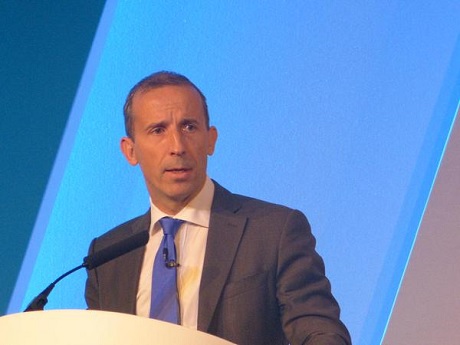Areva faces three major challenges as it turns itself around from its record 2014 losses, company CEO Philippe Knoche said today.
 |
| Areva's Philippe Knoche addresses the World Nuclear Association Symposium (Image: WNN) |
Those challenges are making sure that the company manages to complete large projects; making sure that it adapts to post-Fukushima market conditions, and making sure that it addresses the level of debt resulting from past investments. Knoche gave examples of such challenges in an address to the World Nuclear Association's 2015 Symposium in London today.
Knoche cited a "large project" in the "far north of Europe" - Areva's project to build an EPR at Olkiluoto in Finland - and "investments made on the basis of 'soft' customer commitments which turned out to be too soft" as two of the reasons behind the company's record 2014 losses of nearly €5 billion ($5.6 billion).
Areva mothballed the Trekkopje uranium project in Namibia in 2012 before it had ramped up to full production, after a fall in uranium prices and demand in the wake of the Fukushima accident. It was also hit by impairment charges to upgrading work at its Comurhex II uranium conversion plant project in France.
Earlier this year the company announced a two-part strategy to return to profitability by refocusing on its core business of nuclear power. As part of that strategy EDF is taking control of Areva's reactor business. Knoche promised that steps were being taken to ensure that synergies and experience gained over time would not be lost through the move, with Areva remaining a shareholder to ensure that synergies would continue in the long term. EDF and Areva will join forces in a specific entity dedicated to new build, Knoche said. All the agreements for these changes are now in place, with the regulatory process to start by the end of 2015 and a view to completion before the end of 2016.
Knoche said that the company will refocus its renewable energy activity, which will be limited solely to it offshore wind joint venture with Spanish wind turbine manufacturer Gamesa, and sell its shares in nuclear measurement and instrumentation specialist Canberra. Instead, its activities will be focused on the two newly created entities focusing on the nuclear fuel cycle and the reactor business. As well as refocusing, the company is aiming to reduce costs through staff cuts and streamlining to reduce management layers and achieve a simplified organisation.
Knoche identified partnerships as crucial to enable any company in today's nuclear sector to develop, and promised that Areva's existing partnerships will not be affected by the changes.
Innovation was highlighted by Knoche as the final point underpinning Areva's recovery plan, citing examples of new products for PWR and BWRs including new test assemblies for Gaia PWR fuel and Atrium 11 BWR fuel which he claimed had a "clear competitive edge".
Knoche said that the company intended to build on its strong assets and key technologies. "I'm sure that in the light of some encouraging signs in the market - the restart of Sendai commercial operations, signs we are getting from China regarding new builds, and in the US lifetime extensions, Areva the has assets to meet these," he said.
Researched and written
by World Nuclear News







_94566.jpeg)






